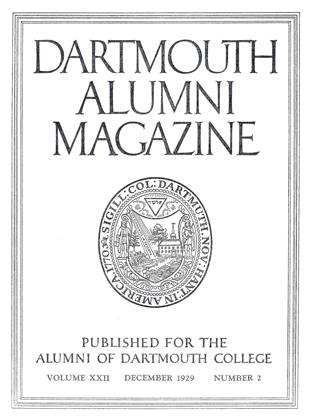Little that was of momentous importance was done at the most recent meeting of the Alumni Council, held this year in New York on the day before the Yale game, the business being mainly of a routine character. The Council, as was natural, renominated Mr. Knight for the second term as an alumni trustee to which he was eligible, alike as a fitting compliment to a loyal and useful member of this board and as the best means of serving the College.
Three new members-at-large, increasing the total membership of the Council to 28, were chosen under a new provision of the constitution ratified last June by the general meeting of the alumni. By this provision the Council is empowered to choose six, instead of three, members-at-large to serve for stated terms, the intent being to apportion such among the parts of the country which would otherwise be unable to elect a regional representative. The result is to give us a Council fairly representative of the alumni of every section of the United States; and as time goes on the usefulness of this body as an adjunct of the administration becomes more and more apparent.
The set-up of the organization of the Alumni Fund this year remains much as it was before, with the exception of a slightly increased quota. The Council has authorized $135,000 as the goal for 1930—an advance of only $5,000 over last year when the quota was, somewhat to the surprise of the managers, attained on the first essay. The intensive campaign for the Fund will not begin until March, but it is well to have the matter in mind. The helpful alumnus treats this as a fixed item in his yearly calculations—a thing to be provided for against the time of call—and thus facilitates the work of the committee.
By the time of this printing the annual investigations in support of the Selective Process will be at hand. Usually this interviewing of applicants by councillors and sub-committees takes place during the Christmas holidays when the applicants are for the most part at home from school. This work, the importance of which can hardly be overstated, has to do not at all with scholarship, but only with character; and on a discriminating judgment in those charged with the work depends the excellence of next year's freshman class.
Long practice has begun to make perfect, if records are a fair criterion. Comparatively few of Dean Bill's questionnaires are now returned with a complete absence of information concerning the boys. The bulk of them are turned in by the councillors responsible with commendable promptitude and with every evidence that a genuine attempt has been made to find out whether each applicant looks like straight-grained Dartmouth material, on whom it is advisable to expend time and educational effort. If one thing more than another is desirable, it is that investigators of these young men be wholly candid in stating whether or not those whom they interview seem to them to be fit.
The whole idea of the Selective Process is to improve the breed of Dartmouth students, and the record since the system has been in use indicates very clearly that this end is being attained. At all events fewer than in the older years fall by the wayside for lack of scholastic standing or other defect. The zeal, loyalty and discrimination with which alumni of the college the country over perform this work of winnowing the wheat from the chaff merit unstinted praise.
 View Full Issue
View Full Issue
More From This Issue
-
 Class Notes
Class NotesCLASS OF 1923
December 1929 By Truman T. Metzel -
 Article
ArticleAlumni Associations
December 1929 -
 Article
ArticleAlumni Council Meets in New York
December 1929 -
 Article
ArticleCarnegie Report
December 1929 -
 Article
ArticleThe Dartmouth Indians
December 1929 By Eric P. Kelly -
 Sports
SportsThe Yale Epic
December 1929 By Phil Sherman







